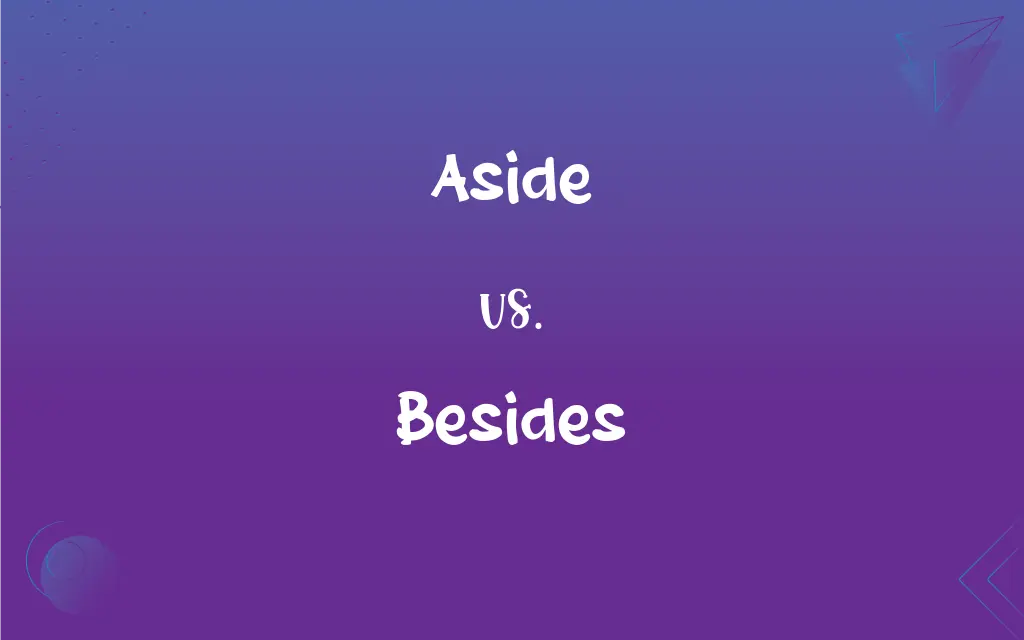Aside vs. Besides: What's the Difference?
Edited by Harlon Moss || By Janet White || Updated on October 7, 2023
"Aside" means to place something to one side or to make a remark, while "besides" means in addition to or apart from.

Key Differences
The terms "aside" and "besides" serve distinct purposes in English, providing unique ways to convey additional information or clarification. "Aside" can denote a physical movement, as when something is placed to one side, or it can signify a remark intended to be heard by a limited audience, often providing supplementary information or commentary. This term can bring subtle nuances to dialogues, allowing speakers or writers to impart additional thoughts or reflections without directly inserting them into the main discourse.
In contrast, "besides" functions as a preposition or an adverb, emphasizing inclusiveness or addition. When used as a preposition, "besides" means in addition to or apart from, allowing for the inclusion of elements not previously mentioned. As an adverb, "besides" implies furthermore or moreover, enabling the provision of added details or facts that enrich the context. It's instrumental in extending conversations or writings by offering additional points or elements, thus widening the scope of discussion or consideration.
"Aside" often lends itself to theatrical contexts, where characters share thoughts or emotions with the audience that other characters aren’t supposed to hear. This use enriches narratives, allowing for the revelation of internal states, motivations, or conflicts that contribute to character development and plot advancement. It's a strategic literary device, capable of adding layers of meaning and complexity to dialogues, fostering a deeper understanding and connection with characters and their journeys.
"Besides," on the other hand, is versatile, extending its applicability to various situations where additional items or ideas need to be conveyed. It’s pivotal in expanding lists or sequences, making it explicit that there are other elements or considerations in play. "Besides" is comprehensive, ensuring that conversations or writings are more inclusive and exhaustive, which is crucial for clarity and thoroughness in communication.
"Besides" and "aside," though serving different grammatical functions, both play pivotal roles in enriching English expressions. "Aside" allows for more nuanced, indirect revelations of thoughts or feelings, while "besides" offers a clear, straightforward way to incorporate additional items or ideas, thus ensuring the breadth and depth of communication.
ADVERTISEMENT
Comparison Chart
Grammatical Role
Used as a noun, adverb, or a preposition.
Serves as a preposition or adverb.
Usage
To convey a remark or place something to one side.
To mean in addition to or apart from.
Context
Often found in theatrical or literary contexts.
Common in everyday language to add information.
Meaning
Can imply a separation or a supplementary remark.
Emphasizes inclusiveness or additional information.
Example
“Let’s put that idea aside for now.”
“Besides chocolate, she also likes vanilla.”
ADVERTISEMENT
Aside and Besides Definitions
Aside
Excluding or disregarding.
“Aside from his appearance, he was a gentle man.”
Besides
Moreover; furthermore.
“The plan is risky; besides, it is expensive.”
Aside
A remark intended to be heard by a limited audience.
“He made a humorous aside about the situation.”
Besides
Used to emphasize a point or for emphasis.
“I don’t want to go to a restaurant; besides, we have food at home.”
Aside
To place something to one side.
“She set the book aside to answer the phone.”
Besides
In addition to; apart from.
“Besides math, she is also excellent in science.”
Aside
A temporary departure from a main theme or topic.
“He went on an aside about his childhood.”
Besides
In addition; also
I could smell the ocean, some pine trees, and something else besides.
Aside
Out of the way; in reserve.
“Put some money aside for emergencies.”
Besides
Moreover; furthermore
I'm too tired to go for a walk. Besides, it's raining.
Aside
To or toward the side
Step aside.
Besides
Otherwise; else
Has been to Mexico but nowhere besides.
Aside
Out of one's thoughts or mind
Put my doubts aside.
Besides
In addition to
She was given a scholarship besides the award.
Aside
Apart
A day set aside for relaxing.
Besides
Except for; other than
No one besides the owner could control the angry dog.
Aside
In reserve; away
Put a little money aside.
Besides
In addition, in addition to.
Aside
Being excepted or excluded from consideration
All joking aside, can you swim two miles?.
Besides
Other than; except for; instead of.
I don't want to go anywhere besides India.
Aside
A piece of dialogue intended for the audience and supposedly not heard by the other actors on stage.
Besides
(obsolete) Beside.
Aside
A remark made in an undertone so as to be inaudible to others nearby.
Besides
(conjunctive) Also; in addition.
Aside
A parenthetical departure; a digression.
Besides
(conjunctive) Used to emphasize an additional point, especially an important or stronger reason; moreover; furthermore.
I don't feel like going out tonight. Besides, I have to work tomorrow morning anyway.
Aside
To or on one side so as to be out of the way.
Move aside, please, so that these people can come through.
Besides
Otherwise; else.
I have been to Spain but nowhere besides.
Aside
Not in perfect symmetry; distorted laterally, especially of the human body.
Besides
(obsolete) On one side.
Aside
An incidental remark to a person next to one made discreetly but not in private, audible only to that person.theatre (theatre) A brief comment by a character addressing the audience, unheard by other characters.
Besides
On one side.
Aside
A minor related mention, an afterthought.
Besides
More than that; over and above; not included in the number, or in what has been mentioned; moreover; in addition.
The men said unto Lot, Hast thou here any besides ?
To all beside, as much an empty shade,An Eugene living, as a Cæsar dead.
Aside
On, or to, one side; out of a straight line, course, or direction; at a little distance from the rest; out of the way; apart.
Thou shalt set aside that which is full.
But soft! but soft! aside: here comes the king.
The flames were blown aside.
Besides
Over and above; separate or distinct from; in addition to; other than; else than. See Beside, prep., 3, and Syn. under Beside.
Besides your cheer, you shall have sport.
Aside
Out of one's thoughts; off; away; as, to put aside gloomy thoughts.
Besides
Making an additional point; anyway;
I don't want to go to a restaurant; besides, we can't afford it
She couldn't shelter behind him all the time and in any case he wasn't always with her
Aside
So as to be heard by others; privately.
Then lords and ladies spake aside.
Besides
In addition;
He has a Mercedes, too
Aside
Something spoken aside; as, a remark made by a stageplayer which the other players are not supposed to hear.
Besides
Otherwise than; except.
“There’s no one here besides us.”
Aside
A line spoken by an actor to the audience but not intended for others on the stage
Besides
On the side; elsewhere.
“Let’s set it down besides the table.”
Aside
A message that departs from the main subject
Aside
On or to one side;
Step aside
Stood aside to let him pass
Threw the book aside
Put her sewing aside when he entered
Aside
Out of the way (especially away from one's thoughts);
Brush the objections aside
Pushed all doubts away
Aside
Not taken into account or excluded from consideration;
These problems apart, the country is doing well
All joking aside, I think you're crazy
Aside
In a different direction;
Turn aside
Turn away one's face
Glanced away
Aside
Placed or kept separate and distinct as for a purpose;
Had a feeling of being set apart
Quality sets it apart
A day set aside for relaxing
Aside
In reserve; not for immediate use;
Started setting aside money to buy a car
Put something by for her old age
Has a nestegg tucked away for a rainy day
FAQs
Is aside used in theater?
Yes, an aside in theater is a remark by a character intended to be heard by the audience but not by other characters.
Does besides always introduce additional items?
Generally, yes, besides often introduces additional items or information.
Can aside mean apart from?
Yes, “aside from” can mean apart from or excluding.
About Author
Written by
Janet WhiteJanet White has been an esteemed writer and blogger for Difference Wiki. Holding a Master's degree in Science and Medical Journalism from the prestigious Boston University, she has consistently demonstrated her expertise and passion for her field. When she's not immersed in her work, Janet relishes her time exercising, delving into a good book, and cherishing moments with friends and family.
Edited by
Harlon MossHarlon is a seasoned quality moderator and accomplished content writer for Difference Wiki. An alumnus of the prestigious University of California, he earned his degree in Computer Science. Leveraging his academic background, Harlon brings a meticulous and informed perspective to his work, ensuring content accuracy and excellence.































































